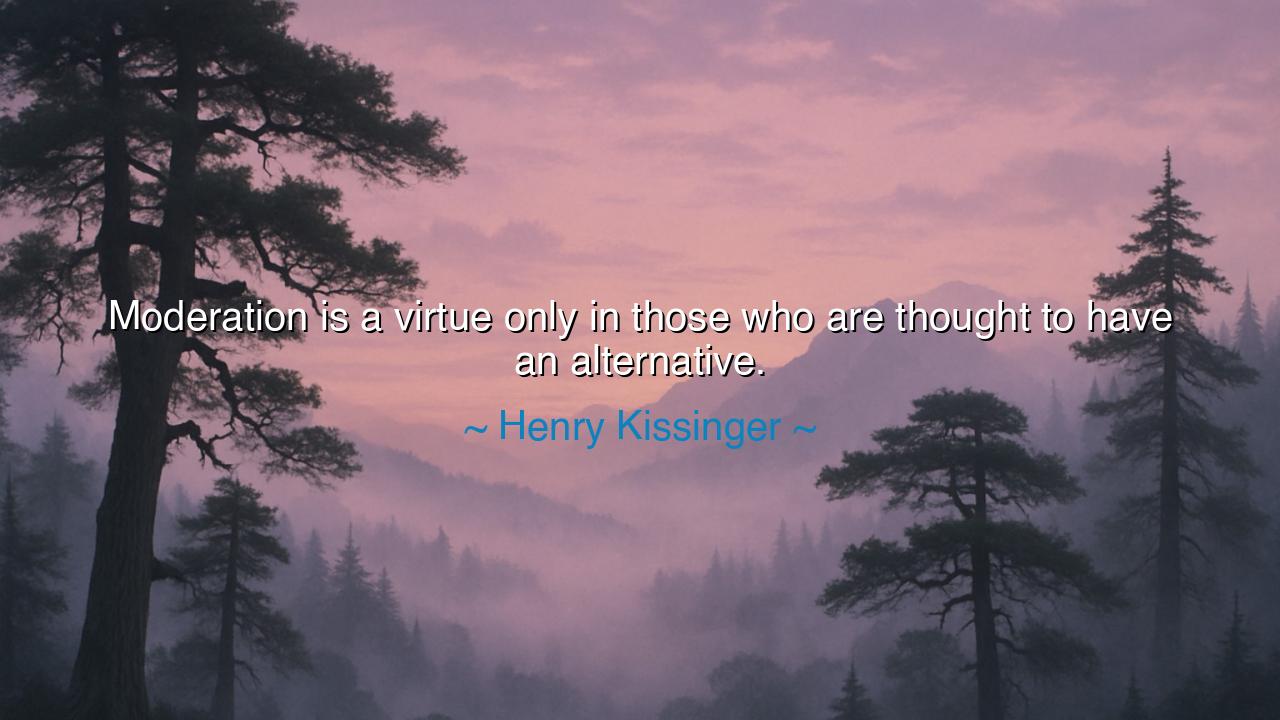
Moderation is a virtue only in those who are thought to have an






“Moderation is a virtue only in those who are thought to have an alternative.” Thus declared Henry Kissinger, a statesman of towering intellect and sharp paradox, whose words, though rooted in the realm of diplomacy, echo across the whole landscape of human striving. In this statement, there is both wisdom and warning — a reflection on the delicate balance between power and restraint, between the strength to act and the wisdom to hold back. Kissinger’s insight is not a mere praise of moderation; it is a revelation of its true cost. For moderation, he says, is only admirable when it is chosen freely, not when it is the disguise of weakness.
In the ancient days, philosophers spoke often of moderation as the golden mean — the balance between excess and deficiency, the steady path of virtue between extremes. Aristotle called it the highest discipline of character, the art of knowing “how much is enough.” Yet Kissinger, with the cunning of a modern strategist, adds a shadow to this golden ideal. He reminds us that moderation, when born of necessity, is not virtue but resignation. It is not noble to be moderate when one is incapable of excess. True moderation, he implies, is the privilege of the powerful — the act of a man or nation that can unleash force but chooses peace instead.
Consider the mighty Roman Empire, whose legions could bring ruin upon any kingdom they pleased. When Rome offered mercy or restraint, it was not because it lacked the sword, but because it mastered it. The Romans understood that self-control has meaning only when one has the strength to do otherwise. Their moderation, when genuine, was a sign of confidence and dominance, not frailty. But when Rome began to grow weary, when its power waned and its moderation became a mask for exhaustion, its restraint was no longer virtue — it was surrender. Kissinger’s words echo that same ancient lesson: moderation without strength is not wisdom, but impotence disguised as morality.
Kissinger himself, a man forged in the fires of the Cold War, spoke from experience. He stood at a time when two great powers — the United States and the Soviet Union — faced one another across a chasm of destruction. To be moderate then was not to be timid, but to be deliberate. The hand that held the nuclear sword had to tremble with care, for a single misstep could set the world ablaze. And yet, moderation in such hands was respected precisely because those hands had the alternative — they could destroy, but chose not to. It is a truth as old as war and peace alike: the world honors mercy from the strong, but not from the weak.
This principle extends far beyond politics. In the realm of human life, too, moderation is only meaningful when we possess the power to do more — to indulge, to retaliate, to dominate — and yet refrain. The wealthy man who lives simply is respected for his discipline; the poor man who does so has no choice. The warrior who spares his foe earns reverence; the one too weak to strike earns none. The artist who limits his brushstrokes reveals mastery; the one who limits because he cannot do more exposes his lack of skill. Thus, true virtue lies not in the act itself, but in the freedom behind it.
Yet, Kissinger’s statement also carries a challenge to the spirit: to build the strength that makes moderation possible. For moderation without power is survival; moderation with power is wisdom. It teaches us that before we can afford to be humble, we must first be capable of greatness. Before we can choose restraint, we must first have the ability to act. A man who fears the storm cannot call himself calm — only he who commands the tempest and still chooses silence has mastered peace.
So, O seeker of truth and balance, take this teaching to heart. Do not mistake weakness for virtue, nor confusion for humility. Strive first to strengthen your mind, your skill, your resolve — for only when you have the alternative can your restraint have meaning. Let your moderation come not from fear, but from understanding; not from lack, but from mastery. Be fierce in your learning, powerful in your character, and patient in your judgment. Then, when the world sees your calm, they will know it is the calm of power contained — not the quiet of surrender, but the serenity of command.
Thus, Kissinger’s paradox becomes timeless wisdom: moderation is not for the powerless, but for the mighty. It is not born from frailty, but from fullness. Therefore, live as one who has the strength to act but the wisdom to wait, the power to strike but the grace to withhold. For only then will your moderation be virtue — the sign not of what you lack, but of what you have mastered within yourself.






AAdministratorAdministrator
Welcome, honored guests. Please leave a comment, we will respond soon